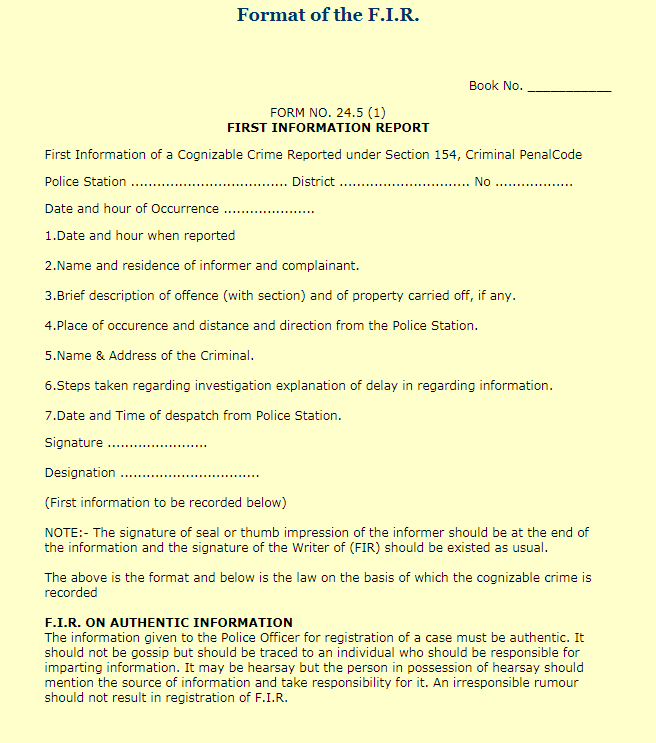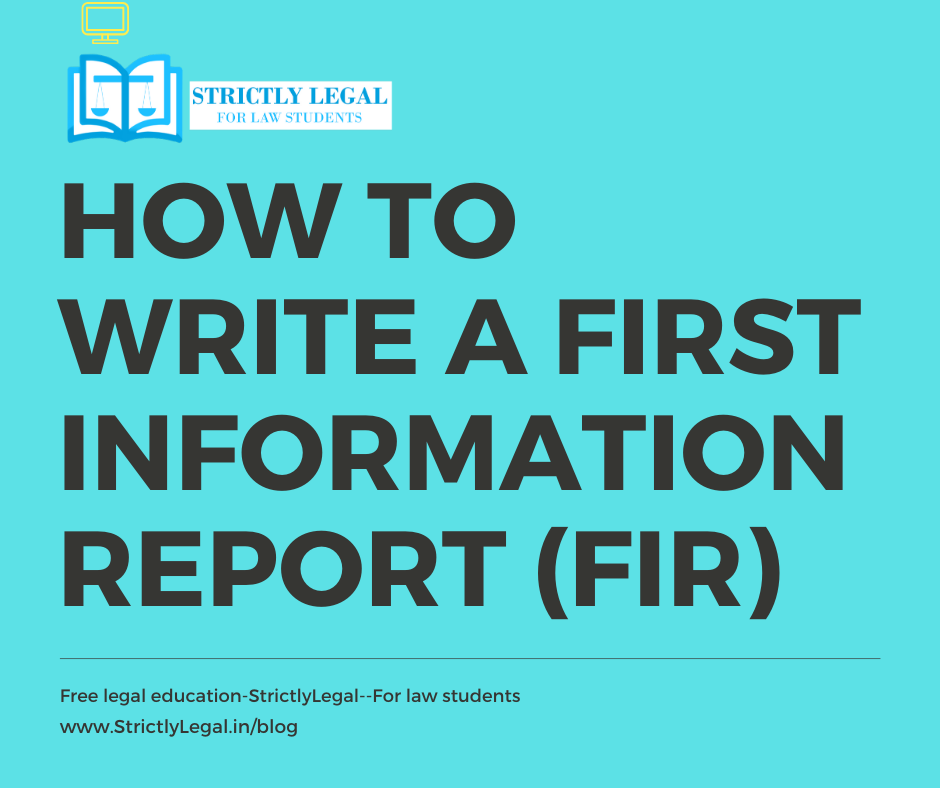We have all heard of registering FIR in all sorts of circumstances, from losing a mobile phone to getting kidnapped. A first Information report is MUST where an offence has taken place.
Questions like how to file an FIR and who can file an FIR, etc are dealt with on this post. Read further to know more.
Here’s a guide to writing a First Information Report.
Table of Contents
What is First Information Report (FIR)?
First information report also known as an FIR is submitted at the police station to enable the police to take cognizance of an offense.
It is written and signed by the complainant and submitted at the police station.
What should an FIR contain?
Since, the first information report (FIR) is something that starts the initial police investigation, it is recommended to contain your report with all the first hand relevant information that may help the police in the investigation.
I should include:
- Your name and address
- Place of occurence of the event reported
- Time of the occurence
- Details of the occurence
- Description of the person against whom the FIR is lodged; if available.
You can also file an unknown FIR if the person alleged is not known.
When can the FIR be filed?
An FIR must be filed as soon as possible. There is no prescribed time limit as to when should an FIR be filed but prompt action is always recommended. If you delay in filing the same, you may face questions from the court or magistrate on the reasons for the delay.
Where should FIR be filed?
If the offense for which the FIR is to be filed is a cognizable offence then the provisions of law do not state any jurisdictional requirement. That is, an FIR for a cognizable offence can be filed anywhere in India.
On the other hand, according to Section 155, CrPc, if the FIR in question relates to a non-cognizable offence then it must be filed within the territorial jurisdiction of the police station that is the nearest police station from the place of occurrence.
Who can file an FIR?
Any person can file an FIR. It is not mandatory for only the victim to file the same. Even if you are an eyewitness to an offence, you have the right to file it.
Things to keep in mind while filing the First Information Report
- MUST be filed by the police officer or the complainant. If the person is illiterate, the complaint must be dictated by the complainant to the officer-in-charge who shall reduce the same in writing and dictate it to the complainant before it is signed and stamped by the officer.
Source:
Section 154 Cr.P.C
“Every information relating to the commission of the cognizable offence, if given orally to an officer-in-charge of a police station, shall be reduced to writing by him or under his direction, and be read over to the informant and every such information, whether given in writing or reduced to writing as aforesaid, shall be signed by the person giving it, and the substance thereof shall be entered in a book to be kept by such officer in such form as the State Government may prescribe in this behalf.
- A copy (photo-copy) of the FIR filed must be returned to the complainant by the officer free of cost.
A copy of the information as recorded under sub- section (1) shall be given forthwith, free of cost, to the informant.
Section 154(2) in The Code Of Criminal Procedure, 1973
- Police cannot refuse to accept an FIR under any circumstances. If the police officer refuses to register an FIR, he maybe punished as follows.
Public servant disobeying direction of law with intent to save person from punishment or property from forfeiture.—Whoever, being a public servant, knowingly disobeys any direction of the law as to the way in which he is to conduct himself as such public servant, intending thereby to save, or knowing it to be likely that he will thereby save, any person from legal punishment, or subject him to a less punishment than that to which he is liable, or with intent to save, or knowing that he is likely thereby to save, any property from forfeiture or any charge to which it is liable by law, shall be punished with imprisonment of either description for a term which may extend to two years, or with fine, or with both.
Section 217 in The Indian Penal Code
What is the recourse if the Police officer does not register the FIR?
If the police refuse to register the FIR, the person aggrieved may send in writing and by post to the Superintendent of Police about the same. If the Superintendent of Police is satisfied that the FIR refers to the commission of a cognizable offence shall take such necessary steps as provided in the code of criminal procedure or instruct the police officer under him about the same.
Any person aggrieved by a refusal on the part of an officer in charge of a police station to record the information referred to in subsection (1) may send the substance of such information, in writing and by post, to the Superintendent of Police concerned who, if satisfied that such information discloses the commission of a cognizable offence, shall either investigate the case himself or direct an investigation to be made by any police officer subordinate to him, in the manner provided by this Code, and such officer shall have all the powers of an officer in charge of the police station in relation to that offence.
Section 154(3) in The Code Of Criminal Procedure, 1973
Can an Accused person register an FIR?
Yes. Whenever a police officer recieves any information relating to a cognizable offense, he is bound to issue an FIR even if it comes from the accused.
Now, the question arises, why would an accused register an FIR for an offence done by him?
He may try registering an FIR with false information to save himself or he may he may try confessing the offence done by him.
- The FIR must be signed by the complainant or informant as the case maybe. In case, the FIR is not read out to him or contains any invalid information. he may refuse to sign it.
However, if the information is given to the police officer and the complainant or the informant refuses on sign it he may be prosecuted under section 180, IPC.
Refusing to sign statement.—Whoever refuses to sign any statement made by him, when required to sign that statement by a public servant legally competent to require that he shall sign that statement, shall be punished with simple imprisonment for a term which may extend to three months, or with fine which may extend to five hundred rupees, or with both.
Section 180 in The Indian Penal Code
- The FIR filed need not contain ALL the information
The First Information Report is not an encyclopedia that it must contain all the information, it is just a first-hand report of an offence. However, it is recommended to file an FIR with as much information as possible so as to assist the police in its further investigation.
More information on First Information Report WIKIPEDIA
Format for a First Information Report

Sample FIRs
You should also have a look at What Happens After an FIR is filed.

Passionate about using the law to make a difference in people’s lives. An Advocate by profession.




